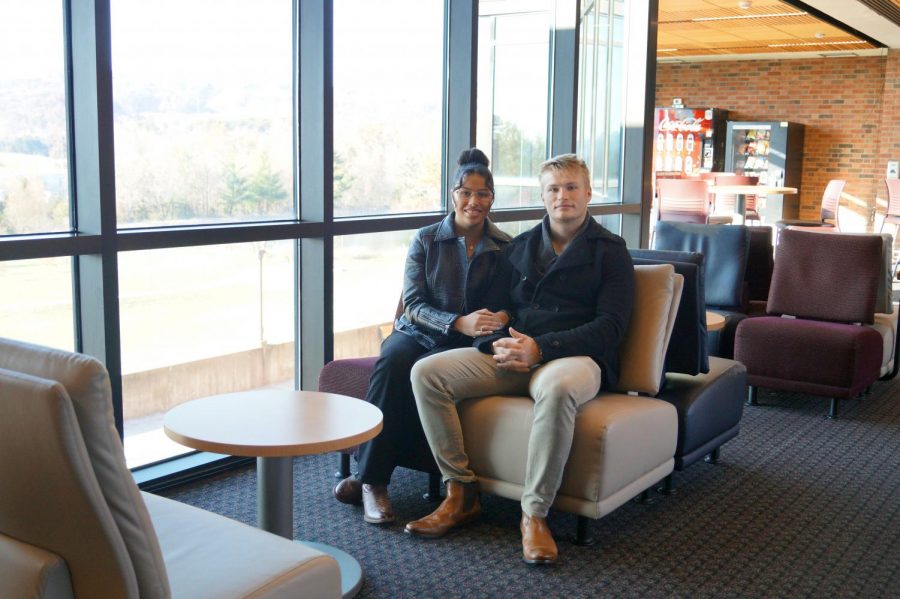
To a lot of IUS students, Brian Dennis, biology sophomore, said he is known as “the guy who cooks the omelets.”
Dennis has been working the morning shift in the Food Court all semester, but this is merely a break from his other “batty” job.
During summer breaks, Dennis trades his cooking utensils in for tracking devices and nets. His work no longer centers on the needs of students, but of wild bats. And just as Bruce Wayne’s work as an entrepreneur is merely a side job from being Batman, Dennis’ omelet work is a side job from being his own form of “Batman.”
“Well, I catch bats,” he said, jokingly putting his job in the simplest terms.
For the past two years, Dennis has worked for an environmental consulting company called Environmental Solutions Innovations as a field technician. His position works as an assistant to the company’s biologists.
“We do endangered species studies,” Dennis said. “Basically, whenever there’s a big construction project that has to do endangered species surveys, we go and see what endangered species are there.”
He said this means he and his co-workers live out of hotels for the summer, traveling to different locations as requested by construction companies.
Dennis said the Cincinnati-based company works along the eastern side of the United States. This summer, he worked in different areas of New York, Pennsylvania and West Virginia.
Dennis’ work has only centered on endangered bats, especially the species known as the Indiana bat.
“I’ve basically only had to deal with the Indiana bats,” he said. “They are the main concern. Basically, if you find an Indiana bat, especially if you find a roost in a construction project area, that project pretty much gets halted until they decide what to do with it.”
He and his team find endangered bats by setting up nets, which Dennis said are anywhere from 9- to 30- feet wide and 20- to 30-feet tall and made of thin wire similar to fishing wire. They set up the nets at night and wait for the bats to fly in, hoping to capture them. He said they check the nets every 10 minutes and pass time by playing the guitar and reading.
If an endangered bat is caught, construction will be halted, but if a non-endangered bat is caught, the workers take them out of the nets and release them back into the wild. This, Dennis said, can have painful effects on their hands.
“Big Browns have some nasty teeth on them for little things,” he said. “We’ve got the scars to prove it.”
Dennis said the job’s hours vary, depending on whether or not any endangered bats are found.
“I can work anywhere from noon or 1 in the afternoon to 3 in the morning,” he said.
Besides capturing bats, Dennis said he also knows the scientific names of various bats, as well as some plants and trees, because they have to fill out habitat sheets that describe the area they are working in.
Dennis said aside from working with animals that most people do not get to, one of his favorite parts of the job is getting to travel and meet new people.
“I get to go to new areas, and it’s not like going to just tourist traps,” he said. “You’re actually living in areas where local people live.”
That is because, as Dennis said, construction sites are not only in wooded or forested areas but can be close to people’s homes. Therefore, they sometimes set up nets near houses.
“We can see people eating dinner and stuff while we’re just in their front yard catching bats,” he said. “It’s basically back roads. I live in the country, so it’s like people that I would be neighbors with that would never see this stuff. They see nets getting put up in their backyard.”
Dennis said most people are interested in what the group is doing, but some are not welcome to it because they are unaware of what they are actually doing. Some people have tried to drive through their nets, he said, but others will come and hang out with them.
Dennis said a lot of bats are dying because of a disease called white-nose syndrome, which is thought to be caused by a fungus. The fungus somehow wakes the bats up during the winter, and, since they are not supposed to be awake during the winter, they starve and freeze to death.
Though humans cannot suffer from the disease, Dennis said they can spread it, which is why some caves in Indiana have been closed to the public.
Because of this risk, the company has strict disinfectant protocols. Dennis said they use Lysol on the nets, wear gloves when handling bats and have to get rabies vaccinated.
He said the disinfecting stage is his least favorite part of the job because it is a lot of cleaning, but it does not take away from the job he loves.
Dennis said he got the job because his high school biology teacher knew one of the company’s coordinators. The coordinator let her know that they were in need of field technicians, and since she knew Dennis was interested in that type of work, she suggested him for the job.
Dennis said he plans on keeping the job again this summer. Aside from that, he hopes to continue traveling, start up a band and “just do whatever’s interesting.”
By SAMANTHA FRAZIER
Staff
sefrazie@ius.edu




